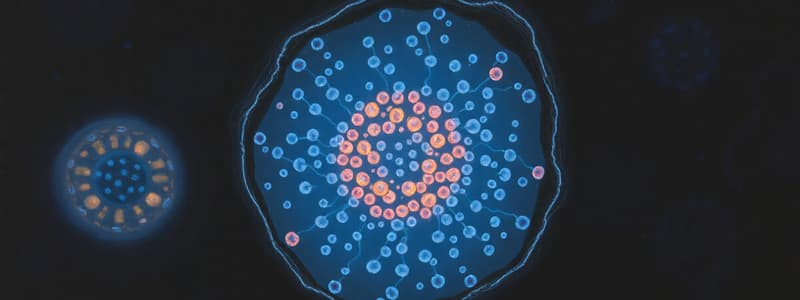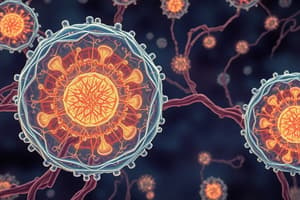Podcast
Questions and Answers
सभी कोशिकाएं पूर्व में अस्तित्व में रही कोशिकाओं से उत्पन्न होती हैं।
सभी कोशिकाएं पूर्व में अस्तित्व में रही कोशिकाओं से उत्पन्न होती हैं।
True (A)
सभी जीवित जीवों का निर्माण किससे होता है?
सभी जीवित जीवों का निर्माण किससे होता है?
- अणुओं से
- कोशिकाओं से (correct)
- संवहनी प्रणाली से
- ऊतकों से
प्रोकैरियोटिक कोशिकाओं के प्रमुख लक्षण क्या हैं?
प्रोकैरियोटिक कोशिकाओं के प्रमुख लक्षण क्या हैं?
न्यूक्लियस का अभाव, डीएनए नूकोइड में स्थित होता है, और सामान्यतः छोटे और सरल होते हैं।
कोशिका का कार्य का नियंत्रण करने वाला अंग है ______.
कोशिका का कार्य का नियंत्रण करने वाला अंग है ______.
माइटोकॉंड्रिया का कार्य क्या है?
माइटोकॉंड्रिया का कार्य क्या है?
कौन सा अंग प्रोटीन और लिपिड को संशोधित, छांटने और पैक करने के लिए जिम्मेदार है?
कौन सा अंग प्रोटीन और लिपिड को संशोधित, छांटने और पैक करने के लिए जिम्मेदार है?
कोशिका संचार के लिए कौन सा तंत्र महत्वपूर्ण होता है?
कोशिका संचार के लिए कौन सा तंत्र महत्वपूर्ण होता है?
एनेरबोलिज्म मेटाबॉलिज्म का निर्माणात्मक हिस्सा है।
एनेरबोलिज्म मेटाबॉलिज्म का निर्माणात्मक हिस्सा है।
अपोप्टोसिस का क्या महत्व है?
अपोप्टोसिस का क्या महत्व है?
Flashcards are hidden until you start studying
Study Notes
Cell Biology
-
Cell Theory
- All living organisms are made of cells.
- Cells are the basic unit of life.
- All cells arise from pre-existing cells.
-
Types of Cells
- Prokaryotic Cells
- Lack a nucleus; DNA is located in the nucleoid.
- Generally smaller and simpler (e.g., bacteria).
- Eukaryotic Cells
- Have a defined nucleus and organelles.
- Generally larger and more complex (e.g., plants, animals, fungi).
- Prokaryotic Cells
-
Cell Structure
- Plasma Membrane
- Semi-permeable barrier that controls movement of substances in and out of the cell.
- Nucleus
- Contains genetic material (DNA); controls cell activity.
- Cytoplasm
- Gel-like substance where cellular processes occur; contains organelles.
- Organelles
- Specialized structures within the cell, e.g.:
- Mitochondria: Powerhouse of the cell, site of ATP production.
- Ribosomes: Synthesize proteins.
- Endoplasmic Reticulum (ER):
- Rough ER: Studded with ribosomes; synthesizes proteins.
- Smooth ER: Involved in lipid synthesis and detoxification.
- Golgi Apparatus: Modifies, sorts, and packages proteins and lipids.
- Lysosomes: Contain enzymes for digestion and waste removal.
- Chloroplasts (in plants): Perform photosynthesis.
- Cell Wall (in plants and fungi): Provides structural support and protection.
- Specialized structures within the cell, e.g.:
- Plasma Membrane
-
Cell Cycle
- Series of phases that a cell goes through to divide and replicate:
- Interphase: Cell grows and prepares for division (G1, S, G2).
- Mitosis: Division of the nucleus (prophase, metaphase, anaphase, telophase).
- Cytokinesis: Division of the cytoplasm.
- Series of phases that a cell goes through to divide and replicate:
-
Cell Communication
- Cells communicate through signaling molecules.
- Includes mechanisms like:
- Hormonal Signaling: Long-distance communication, involving hormones.
- Neural Signaling: Communication through neurotransmitters across synapses.
-
Membrane Transport
- Passive Transport: Movement of molecules without energy (e.g., diffusion, osmosis).
- Active Transport: Movement of molecules using energy (e.g., protein pumps).
-
Cell Metabolism
- Anabolism: Constructive metabolism; builds molecules and stores energy.
- Catabolism: Destructive metabolism; breaks down molecules to release energy.
-
Cell Differentiation
- Process by which a less specialized cell becomes a more specialized cell type.
- Allows for diverse cell functions within multicellular organisms.
-
Apoptosis
- Programmed cell death; important for development and maintaining homeostasis.
This concise overview captures the essential aspects of cell biology, facilitating quick reference and understanding of key concepts.
कोशिका सिद्धांत
- सभी जीवित जीव कोशिकाओं से बने होते हैं।
- कोशिकाएँ जीवन की मूल इकाई हैं।
- सभी कोशिकाएँ पूर्व-मौजूद कोशिकाओं से उत्पन्न होती हैं।
कोशिका के प्रकार
- प्रोकैरियोटिक कोशिकाएँ
- नाभिक की कमी; डीएनए न्यूक्लियॉइड में स्थित होता है।
- आम तौर पर छोटी और सरल (जैसे, बैक्टीरिया)।
- यूकेरियोटिक कोशिकाएँ
- एक परिभाषित नाभिक और ऑर्गेनेल होते हैं।
- आम तौर पर बड़ी और अधिक जटिल (जैसे, पौधे, जानवर, कवक)।
कोशिका संरचना
- प्लाज्मा झिल्ली
- अर्ध-पारगम्य बाधा जो कोशिका में पदार्थों की गति को नियंत्रित करती है।
- नाभिक
- आनुवंशिक सामग्री (डीएनए) रखता है; कोशिका गतिविधि को नियंत्रित करता है।
- साइटोप्लाज्म
- जैल जैसा पदार्थ जहां कोशिकीय प्रक्रियाएं होती हैं; ऑर्गेनेल होते हैं।
- ऑर्गेनेल
- कोशिका के भीतर विशिष्ट संरचनाएं, जैसे:
- माइटोकांड्रिया: कोशिका का पावरहाउस, एटीपी उत्पादन का स्थल।
- राइबोसोम: प्रोटीन का संश्लेषण करते हैं।
- एंडोप्लाज्मिक रेटिकुलम (ईआर):
- रफ ईआर: राइबोसोम से जड़ा हुआ; प्रोटीन का संश्लेषण करता है।
- स्मूथ ईआर: लिपिड संश्लेषण और विषहरण में शामिल है।
- गोल्गी उपकरण: प्रोटीन और लिपिड को संशोधित, क्रमबद्ध और पैकेज करता है।
- लाइसोसोम: पाचन और अपशिष्ट निष्कासन के लिए एंजाइम होते हैं।
- क्लोरोप्लास्ट (पौधों में): प्रकाश संश्लेषण करते हैं।
- कोशिका भित्ति (पौधों और कवक में): संरचनात्मक समर्थन और सुरक्षा प्रदान करता है।
- कोशिका के भीतर विशिष्ट संरचनाएं, जैसे:
कोशिका चक्र
- चरणों की एक श्रृंखला जिसके माध्यम से एक कोशिका विभाजित होती है और दोहराती है:
- इंटरफेज: कोशिका बढ़ती है और विभाजन के लिए तैयार होती है (G1, S, G2)।
- माइटोसिस: नाभिक का विभाजन (प्रोफेज, मेटाफेज, एनाफेज, टेलोफेज)।
- साइटोकिनेसिस: कोशिका द्रव्य का विभाजन।
कोशिका संचार
- कोशिकाएं सिग्नलिंग अणुओं के माध्यम से संवाद करती हैं।
- इसमें तंत्र शामिल हैं जैसे:
- हार्मोनल सिग्नलिंग: लंबी दूरी का संचार, हार्मोन शामिल होते हैं।
- तंत्रिका सिग्नलिंग: सिनेप्स के पार न्यूरोट्रांसमीटर के माध्यम से संचार।
झिल्ली परिवहन
- निष्क्रिय परिवहन: ऊर्जा के बिना अणुओं की गति (जैसे, प्रसार, परासरण)।
- सक्रिय परिवहन: ऊर्जा का उपयोग करके अणुओं की गति (जैसे, प्रोटीन पंप)।
कोशिका चयापचय
- एनाबॉलिज्म: रचनात्मक चयापचय; अणुओं का निर्माण करता है और ऊर्जा जमा करता है।
- कैटाबॉलिज्म: विनाशकारी चयापचय; ऊर्जा छोड़ने के लिए अणुओं को तोड़ता है।
कोशिका विभेदन
- वह प्रक्रिया जिसके द्वारा एक कम विशिष्ट कोशिका एक अधिक विशिष्ट कोशिका प्रकार बन जाती है।
- बहुकोशिकीय जीवों के भीतर विविध कोशिका कार्यों की अनुमति देता है।
एपोप्टोसिस
- प्रोग्राम्ड कोशिका मृत्यु; विकास और होमोस्टेसिस बनाए रखने के लिए महत्वपूर्ण है।
Studying That Suits You
Use AI to generate personalized quizzes and flashcards to suit your learning preferences.




